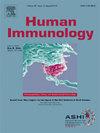First use of imlifidase desensitization in a highly sensitized heart and liver transplant candidate: A case report
IF 2.2
4区 医学
Q3 IMMUNOLOGY
引用次数: 0
Abstract
Heart transplant candidates that are highly sensitized against human leukocyte antigens (HLA) face ongoing challenge in finding immunologically compatible donors. Desensitization strategies aimed at reducing HLA antibody titers have variable success rates. Imlifidase, a novel immunoglobulin G-degrading enzyme derived from Streptococcus pyogenes has been successfully used to eliminate pre-formed antibodies in sensitized kidney transplant recipients. We present the first case of imlifidase use for depleting antibodies in a highly and broadly sensitized heart/liver transplant candidate allowing for transplantation to proceed. Overall, our case demonstrates the feasibility of imlifidase use for the purpose of opening a donor-specific antibody-free window to transplantation in patients who are otherwise not transplantable, due strong sensitization refractory to conventional desensitization approaches.
在高度敏感的心脏和肝脏移植候选人中首次使用氨酰酶脱敏:一例报告
对人类白细胞抗原(HLA)高度敏感的心脏移植候选者在寻找免疫相容的供体方面面临着持续的挑战。旨在降低HLA抗体滴度的脱敏策略有不同的成功率。Imlifidase是一种从化脓性链球菌中提取的新型免疫球蛋白g降解酶,已成功用于消除致敏肾移植受者体内预先形成的抗体。我们提出的第一例使用氨酰酶消耗抗体在一个高度和广泛敏感的心脏/肝脏移植候选人允许移植进行。总的来说,我们的病例证明了使用imlifidase为无法移植的患者打开一个无供体特异性抗体的移植窗口的可行性,因为传统的脱敏方法难以产生强致敏性。
本文章由计算机程序翻译,如有差异,请以英文原文为准。
求助全文
约1分钟内获得全文
求助全文
来源期刊

Human Immunology
医学-免疫学
CiteScore
5.40
自引率
7.40%
发文量
107
审稿时长
12 days
期刊介绍:
The journal''s scope includes understanding the genetic and functional mechanisms that distinguish human individuals in their immune responses to allografts, pregnancy, infections or vaccines as well as the immune responses that lead to autoimmunity, allergy or drug hypersensitivity. It also includes examining the distribution of the genes controlling these responses in populations.
Research areas include:
Studies of the genetics, genomics, polymorphism, evolution, and population distribution of immune-related genes
Studies of the expression, structure and function of the products of immune-related genes
Immunogenetics of susceptibility to infectious and autoimmune disease, and allergy
The role of the immune-related genes in hematopoietic stem cell, solid organ, and vascularized composite allograft transplant
Histocompatibility studies including alloantibodies, epitope definition, and T cell alloreactivity
Studies of immunologic tolerance and pregnancy
T cell, B cell, NK and regulatory cell functions, particularly related to subjects within the journal''s scope
Pharmacogenomics and vaccine development in the context of immune-related genes
Human Immunology considers immune-related genes to include those encoding classical and non-classical HLA, KIR, MIC, minor histocompatibility antigens (mHAg), immunoglobulins, TCR, BCR, proteins involved in antigen processing and presentation, complement, Fc receptors, chemokines and cytokines. Other immune-related genes may be considered.
Human Immunology is also interested in bioinformatics of immune-related genes and organizational topics impacting laboratory processes, organ allocation, clinical strategies, and registries related to autoimmunity and transplantation.
 求助内容:
求助内容: 应助结果提醒方式:
应助结果提醒方式:


